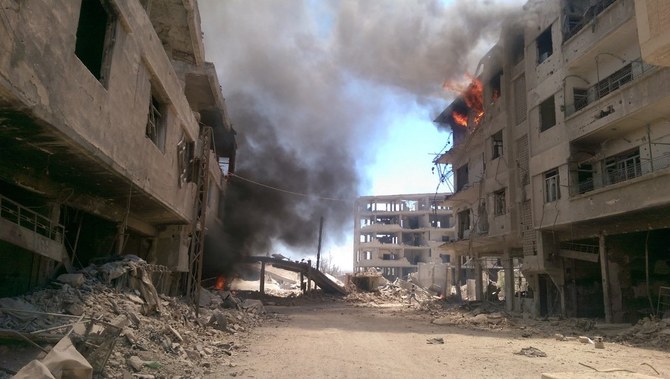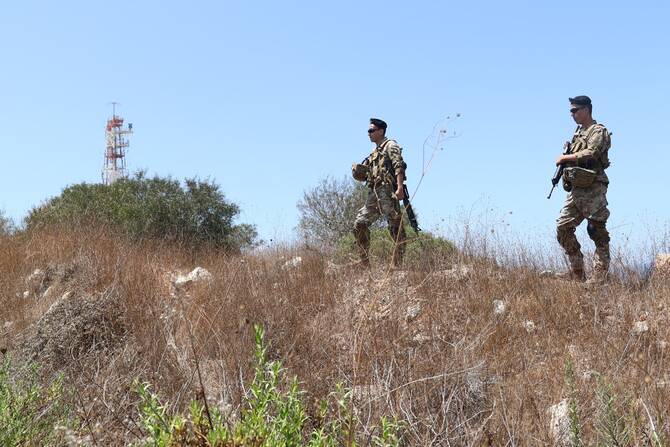LONDON/NEW YORK: A new report has exposed the full extent of the massacre the Syrian regime inflicted on civilians in the town of Daraya 10 years ago, The Guardian reported on Thursday.
In the first detailed investigation into the atrocities, a team from Syria — backed by advocacy group the Syrian British Consortium — found that at least 700 people were killed when regime loyalists pushed into the town between Aug. 24 and 26, 2012.
Soldiers moved door-to-door, killing or detaining men, women and children, sparing few. Terrified families hid in basements while troops shot dead innocent civilians.
The Syrian investigators and the SBC tracked down survivors and witnesses, many of whom had fled the country, to record their testimonies. The investigators now hope that the UN and legal groups will be motivated to prosecute the responsible parties.
“This report records the atrocities perpetrated in Daraya based on the testimony of witnesses and victims, thereby memorializing their accounts and maintaining a record for posterity,” the report said.
“It also showcases that despite the passage of 10 years and the collection of substantial evidence, accountability and justice continue to elude the people of Daraya.
“Despite their disappointment in the international system, witnesses provided their testimony, recounting the heinous crimes committed in Daraya by their own government, based on their belief that their story — their truth — is not only worthy of documentation but may one day assist in bringing justice and accountability.”
The 2012 killings were viewed as the worst atrocity of the conflict at that time. The regime of President Bashar Assad said the massacre was a counterterrorism operation.
Investigators amassed evidence that regime forces and Iranian and Hezbollah militias were present and involved during the attacks on Daraya, based on their uniforms and identifying patches. Experts were also able to identify some forces due to the weaponry and equipment they used. The team was able to identify some of the individuals responsible.
But despite the shocking events, the killings have not attracted significant international attention other than a small reference in a UN report on Syria in 2013, which concluded the Assad regime was carrying out war crimes.
“We chose to investigate this massacre because it was the beginning of the unraveling of Daraya,” Yasmine Nahlawi, a specialist in international law and atrocity prevention, told The Guardian.
“The army had engaged in skirmishes before, going into the city and shooting at demonstrators. But this was the first major event that led to a spiral of targeted campaigns against the city, further massacres, a siege and bombardments.”
Yafa Omar, an investigator who recalled hearing the bombardment of Daraya from Damascus, told the newspaper: “If you allow these crimes to happen in Syria it will become the norm and it will happen elsewhere.
“Syrians doing this paves the way for victims in other countries to use the same tools to pursue justice.”
The report found that the Assad regime and its allies carried out heavy shelling of Daraya in the days before the ground assault.
One witness said: “The regime’s escalation against the city of Daraya began on the first or second day of Eid (Aug. 19 or 20). The bombardments became worse than normal.
“There was mortar shelling and worse types of bombardments with weapons that we didn’t know, with new sounds.”
A different witness said: “We knew that our area’s turn came when the mortars stopped.” Another said that after the attacks the local hospital was “horrific, like doomsday.”
Legal efforts to prosecute regime soldiers have proved difficult but a recent court case in Germany resulted in the conviction of a Syrian officer for crimes against humanity.
Despite this success, attempts by the UN Security Council to refer the Assad regime to the International Criminal Court have been vetoed by Russia and China.
UN spokesman Stephane Dujarric told Arab News: “Whether it’s in Syria or other conflicts, there will come a time for accountability. There will need to be accountability for crimes committed against civilians.
“There are a number of mechanisms that are gathering information on Syria, notably the independent commission set up by the Human Rights Council and others, and it’s very important that everyone support those mechanisms so we can actually get to some accountability at some point.”
When he became secretary-general of the UN in 2017, Antonio Guterres promised to make resolving the Syrian conflict his top priority. Asked where the 12-year war ranks on the UN chief’s list of priorities now, Dujarric told Arab News: “I can tell you that it remains a focus.”
He noted in particular the secretary-general’s vocal advocacy of the need to renew the cross-border mechanism for the delivery life-saving aid, so that it can continue to flow to the 4 million Syrians in the northwest of the country facing the specter of famine.
“Any secretary-general has a set of priorities,” said Dujarric. “The world also comes up with priorities as we go. This question often comes up. It’s not as if there is a crisis that is a favorite child of his, right?
“I think Antonio Guterres, at the heart, is deeply humanitarian and he is trying to help everyone who needs our help.”
Dujarric added that the efforts of Geir Pedersen, Guterres’ special envoy for Syria, “in pushing on the political track” are ongoing. Pedersen visited Moscow on Thursday, where he met Foreign Minister Sergey Lavrov.
(Ephrem Kossaify in New York contributed to this report.)


























